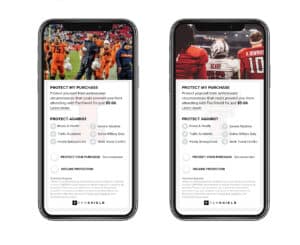BETTER SAFE THAN SORRY: Protecht CEO Bryan Derbyshire launched the ticket insurance company six years ago. (Courtesy vendor)
Ticket insurance moves beyond early adopters
Bryan Derbyshire had a career in payments-related fintech in 2016 he launched Protecht, a ticket protection company now in Phoenix, Arizona, that sought to bring a right-scaled version of the service to smaller venues and events. Protecht’s licensed subsidiary FanShield, LLC was later created to distribute insurance in the U.S.
“I have worked with integrated ecommerce platforms my whole professional career,” he said.
Derbyshire saw that for ecommerce platforms, chargebacks and refund losses were migraine-sized headaches, he said.
“Well, a bunch of different companies have attacked the kind of quote unquote, true fraud problem, which is what everybody thinks about is like a hacker from Eastern Europe getting into your bank account stealing your money. That’s like a 3% problem; 97% of chargebacks come because of buyer’s remorse, either on purpose or on accident, that you’d regret the transaction,” he said. “So, I entered the space.”
Buyer’s remorse was happening “because consumers bought something they didn’t understand, or they couldn’t afford or there was another issue,” Derbyshire said.
Other industries grappling with similar issues developed solutions and airlines were the first to offer ticket insurance to consumers at scale, commercializing the product and making it an industry norm, Derbyshire said.
“When we came into this space there was really only one player and they worked with the biggest ticket platforms of the world and the top handful of clients that are focusing on high-dollar tickets to big concerts and large sporting events,” he said. “But what that left was, 87% of the tickets that are sold in United States, or some $60 tickets, non-sold out shows. So, it’s this mixture of where the demand initially was, and where the rest of America sat from a consumer perspective.”

Protecht came in with a plan to service that broader market to include things like family entertainment, and leisure and amusement and local venues, theaters, youth sports.
“We started thinking through these other verticals,” Derbyshire said. “There’s tons of, quote unquote, tickets or registrations that move through these systems, they’re just not big, sold-out shows. So, you have to make the price points different. These people have same problems, they just aren’t going to spend $15 on a policy for a $50 ticket. It just doesn’t make sense.”
Protecht built a FanShield product that gives the appropriate level of protection or peace of mind for the end consumer, but with a sensible price point that give ticket buyers an upside.
“For a $6 policy, or a $5.50 policy, which is, on average, what these things cost, we cover a lot of the unforeseen things that stop you from making a goal,” Derbyshire said. “If one of these things happen to you, you’re not going regardless. It’s helping you get your money back.”
Once a consumer buys a ticket and purchases insurance and then does not attend the event for a covered reason like sickness, a vehicle accident, bad weather or some family emergency prior to the event date, they file a claim with required documentation, receive a confirmation the claim was received and are soon after notified if the claim was approved or not.
Derbyshire says the service helps capturing 4-7% of on-the-fence consumers who are wavering on a ticket purchase and clients enjoy decreases on chargebacks and refund losses by an average of 46%.
Once established, the company gained market share.
It is the ticket insurance partner of Paciolan, which provides ticketing services to a more colleges and universities that any other platform — including 80% or Power Five conference schools — and earlier this year announced a secondary ticketing partnership with SeatGeek.Geek announcement, Paciolan touted renewing more than 30 partners and adding 12 new clients in 2022, adding to its 160 college athletics clients and hundreds of live entertainment venues. Paciolan has the largest presence in college athletics ticketing, working with 80 percent of the Power Five conference schools.
“Now we’ve been, over the last six years, listening to customers, listening to the feedback and we continue on. What’s unique about us is we actually are agnostic in terms of insurance carriers,” Derbyshire said. “We view this as a marketplace. We power multiple carriers with different products that can be honed in based on value. If you are able to pay more, you can have a bunch of different coverages or additional things you want to get and if you want to pay less then you get the standard kind of coverage.”
With the market fit proven, Protecht set about adding not only to its base of clients, i.e. ticketing platforms or leagues or other distribution opportunities, as well as for the end consumer, “and give them more choices and additional coverage for things that weren’t done as well,” he said.
Protecht competes in a market that includes Allianz, which is the ticket protection partner of Ticketmaster and was for AXS until January, when it switch to XCover.
The service had the wind in its sails during and right after the pandemic peaked, but sales levels settled at higher lows than before, Derbyshire explained.
“This market segment had a spike. The market has now plateaued out, but the plateau was higher than previously. It says the consumer demand is absolutely there,” he said. “They want to have a shopping experience similar to what they have at Nordstrom, or Home Depot or anywhere else they shop when they’re doing it online. That’s been the maturation of the demand side. Really, the next step that we’re seeing now is with the platform that we’ve built, because we’re really twofold, we’re a tech platform that can power embedded ecommerce, and then we also have an insurance entity, FanShield, that can go sell insurance through our own platform. And we use one to kind of prove a point to the other.”

Protecht’s newest product iteration allows it to sell third-party insurance products like most people are used to seeing in the travel industry and elsewhere.
“We have the ability now to help venues and ticket-sellers gain more control over a customer journey allowing them to have more control over how the program operates,” Derbyshire said. “We think that’s really the next phase: allowing the platforms to make choices in what they want to offer, how and who they want to offer and how they deal with their end consumers and their needs.”
Derbyshire says to do these things right and sustain the ability to mitigate risk through smart placement of insurance, “everybody has to be on the right side of the balance sheet.”
“You can’t take back bad risks to a carrier and have them stay for very long,” he said, adding that at the same time, you have to care for the consumers. “You have to price this thing appropriately and make sure that the balance between margin and losses is adequate to what their model looks like.”
The market for ticket protection has plenty of growth potential as it moves beyond early adopters and “into the meat of the industry,” he said.
“That’s where we are,” Derbyshire said. “We’ve grown from the middle, and now we compete with the best of the best. When you look at the top platforms on the on the planet, and where we sit, we’re in a good spot.”







